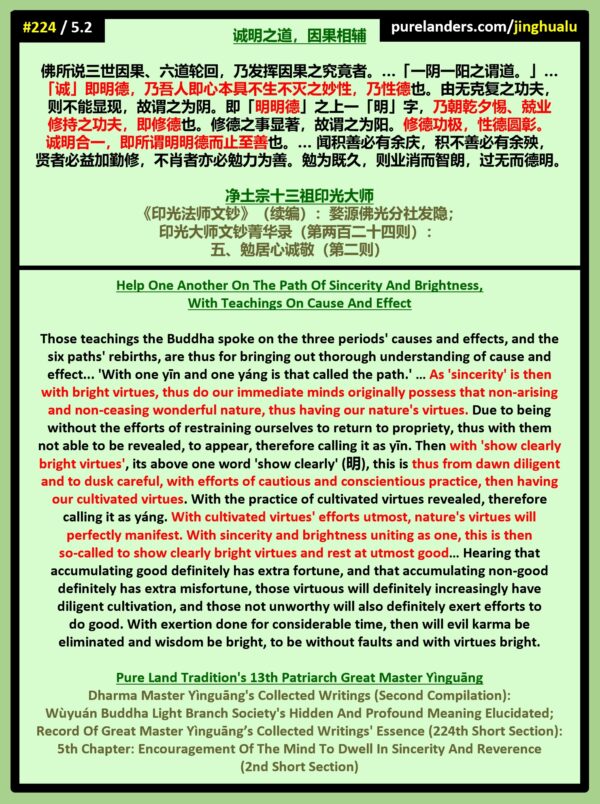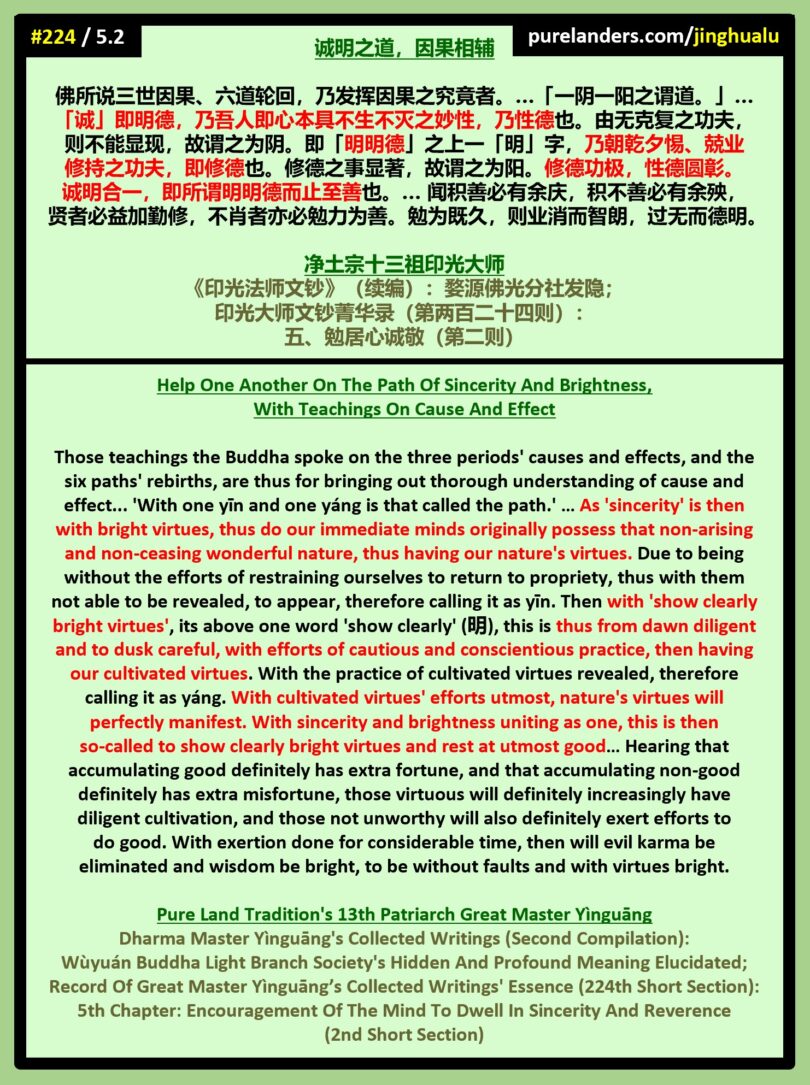诚明之道,因果相辅
[224] Help One Another [On The] Path Of Sincerity [And] Brightness, [With Teachings On] Cause [And] Effect
佛所说三世因果、六道轮回,乃发挥因果之究竟者。
Those [teachings the] Buddha spoke [on the] three periods’ causes [and] effects, [and the] six paths’ rebirths, [are] thus [for] bringing out thorough understanding of cause [and] effect.
[Note 1: The three periods (三世) are the (i) past period (过去世), (ii) present period (现在世) and (iii) future period (未来世). The six paths (六道) are (i) hell-beings’ path (地狱道), (ii) hungry ghosts’ path (饿鬼道), (iii) animals’ path (畜生道), (iv) human beings’ path (人道), (v) asuras’ path (阿修罗道) and (vi) heavenly beings’ path (天道). With the law of karma (业) (i.e. cause and effect: 因果) understood well, we will be able to cease creating the causes for rebirth, and focus on creating the causes for liberation.]
有谓因果为小乘,而不肯提倡。是皆专事空谈,不修实德者。如来成正觉,众生堕恶道,皆不出因果之外,何得独目之为小乘乎?
[There] are [those who] say cause [and] effect is [of the] Small Vehicle, and [are] not willing [to] promote [that. These] are all [who] focus [on] practising empty discussion, not [being] those [who] cultivate true virtues. [As the] Thus Come [Ones’] accomplishing [of] Right Awakening, [and] sentient beings’ falling [into] evil paths, [are] all not outside of cause [and] effect, how can that only [be] seen as [of the] Small Vehicle?
[Note 2: The Small Vehicle’s (小乘) teachings focus (mainly) on self-liberation (解脱), while the Great Vehicle’s (大乘) teachings focus on liberation of one and all, in terms of everyone attaining Buddhahood (佛果).]
其曰:「一阴一阳之谓道。」此所谓道,果何道也?非诚明合一之道乎?
[There is] this saying, ‘[With] one yīn [and] one yáng [is] that called [the] path.’ This so-called path, [is] really which path? [Is it] not [the] path of sincerity [and] brightness uniting [as] one?
[Note 3: The Great Master uses a Taoist (道家) (but universal) teaching’s principle, as an example of balancing the passive or hidden (i.e. sincerity) and active or revealed (i.e. brightness) while walking the path to liberation (解脱), although the Taoist concept of ‘liberation’ is not the same as that in Buddhism. Sincerity and brightness (诚明) are Confucian (儒家) (but universal) concepts on our pure nature and its expression.]
「诚」即明德,乃吾人即心本具不生不灭之妙性,乃性德也。由无克复之功夫,则不能显现,故谓之为阴。
[As] ‘sincerity’ [is] then [with] bright virtues, thus [do] our immediate minds originally possess that non-arising [and] non-ceasing wonderful nature, thus [having our] nature’s virtues. Due [to being] without [the] efforts of restraining [ourselves to] return [to propriety] (克己复礼), thus [with them] not able [to be] revealed, [to] appear, therefore calling it as yīn.
[Note 4: Our original nature (本性) is Buddha-nature (佛性), which is constant with bright virtues (明德), including that of sincerity (诚) to the Buddha’s Dharma teachings (佛法), and to all noble (圣者) and ordinary beings (凡夫), all of whom have Buddha-nature too, with the first having realised it and the latter yet to do so. Nature’s virtues (性德) are the latent (and thus passive) virtues within our Buddha-nature, yet to be awakened through spiritual cultivation. To restrain ourselves to return to propriety (克己复礼) represents alignment to our Buddha-nature.]
即「明明德」之上一「明」字,乃朝乾夕惕、兢业修持之功夫,即修德也。修德之事显著,故谓之为阳。
Then [with] ‘show clearly bright virtues’, its above one word ‘show clearly’ (明), [this is] thus [from] dawn diligent [and to] dusk careful, [with] efforts of cautious [and] conscientious practice, then [having our] cultivated virtues. [With the] practice of cultivated virtues revealed, therefore calling it as yáng.
[Note 5: The opening line of the Great Learning《大学》says, ‘The path of great learning, is to show clearly bright virtues, to be close to people, and to rest upon utmost goodness.’ (大学之道,在明明德,在亲民,在止于至善。) Cultivated virtues (修德) are the revealed (and thus active) virtues from within our Buddha-nature, as awakened through spiritual cultivation.]
修德功极,性德圆彰。诚明合一,即所谓明明德而止至善也。
[With] cultivated virtues’ efforts utmost, nature’s virtues [will] perfectly manifest. [With] sincerity [and] brightness uniting [as] one, [this] is then so-called [to] show clearly bright virtues and rest [at] utmost good.
[Note 6: This is as above, ‘With one yīn and one yáng is that called the path.’ Here, we see the Great Master seamlessly combining some key concepts from the teachings of Buddhism, Taoism and Confucianism. This can create interest in more to learn about Buddhism.]
前此之功夫,为格、致、诚、正、修。后此之事业,为齐、治、平。
Of [the] efforts before this, [they] are investigation [of things] (格物), leading [to knowledge] (致知), sincerity (诚意), [the] upright [mind] (正心) [and self-]cultivation (修身). Of [the] undertakings after this, [they] are management [of family] (齐家), governance [of country] (治国) [and] pacification [of the heavens below] (平天下).
[Note 7: These five efforts and three undertakings together form the eight (secular or worldly) practices (八事) in Confucianism for establishing peace and harmony in the world.]
然此诚明合一,明明德而止至善,以迄于齐、治、平,非凭空即能如是,固自有使之不能不如是者在。何为使之不能不如是者?即所谓三世因果、六道轮回也。
However, [with] this sincerity [and] brightness uniting [as] one, [to] show clearly bright virtues and rest [at] utmost good, with [this] extending to [have] management [of family], governance [of country and] pacification [of the heavens below, these do] not rely [on] nothing, [to] immediately [be] able [to be] thus, certainly [and] naturally having those [which] enable them [to] have to [be] thus there. What enables them [to] have to [be] thus? [They are] thus [the] so-called three periods’ causes [and] effects, [and the] six paths’ rebirths.
[Note 8: The law of karma that powers the rounds of rebirth, as understood and adhered to with wisdom, is what enables the eight practices to be truly successful.]
人虽至愚,决无好凶恶吉、幸灾乐祸者。闻积善必有余庆,积不善必有余殃,贤者必益加勤修,不肖者亦必勉力为善。
People although [with] utmost foolishness, [are] definitely without those fond [of the] inauspicious, [who] hate [the] auspicious, happy [with] disasters [and] joyful [with] misfortune. Hearing [that] accumulating good definitely has extra fortune, [and that] accumulating non-good definitely has extra misfortune, those virtuous [will] definitely increasingly [have] diligent cultivation, [and] those not unworthy [will] also definitely exert efforts [to] do good.
[Note 9: Those with faith and understanding (信解) that doing good has good rewards (善有善报), and that doing evil has evil retribution (恶有恶报) will avoid evil and do good (止恶行善). The more faith and understanding they have, the more conscientious they will be in doing more good and avoiding more evil.]
勉为既久,则业消而智朗,过无而德明。昔为不肖,今为大贤。
[With] exertion done [for] considerable time, then [will evil] karma [be] eliminated and wisdom [be] bright, [to be] without faults and [with] virtues bright. [Those in the] past as [the] unworthy, [will] now be great virtuous [ones].
[Note 10: Practice makes perfect. And more diligent practice attains perfection more swiftly.]
是知诚明之道,于自修则已具足。于教人,非以因果相辅而行,亦不易尽人悉各依从也。
[With] this, know [that the] path of sincerity [and] brightness, for self-cultivation, [is] then already complete. For teaching people, [if] not with [the teachings on] cause [and] effect helping one another then practising, [it is] also not easy [for] all people, [to] all each rely [on] following [it].
[Note 11: To more efficiently walk the path, there should be more sharing, for greater understanding on the law of karma.]
合因果、诚明二法,方为圣人继天立极,垂型万世之道。亦即自心本具之光,与普照法界之佛光也。
Uniting cause [and] effect, sincerity [and] brightness, [these] two methods, [they are] then for sagacious persons [to] succeed nature [in] establishing [the] ultimate, [and to] bequeath examples of [the] path [for] ten thousand generations. [This] is also then, [with the] light that one’s mind originally possesses, and [the] Buddha light that universally illuminates [the] Dharma realm.
[Note 12: Just as the Great Master skilfully used Taoist and Confucian concepts to further elucidate on Buddhist concepts, others should perhaps use Buddhist concepts to elucidate parallel concepts too, although this must be done correctly. The perhaps seldom seen light of our Buddha-nature (佛性) is that of our inherent bright virtues (明德), from our mostly ‘hidden’ nature’s virtues (性德), while the perhaps occasionally seen light of the Buddhas is that of their expressed bright virtues, from their fully cultivated virtues (修德), that are united with their nature’s virtues. Sincere mindfulness of Buddha (念佛) is able to align our Buddha-nature with the Buddha via his light of blessings, which will further awaken our Buddha-nature, to shine more brightly and clearly.]
净土宗十三祖印光大师
Pure Land Tradition’s 13th Patriarch Great Master Yìnguāng
《印光法师文钞》(续编):婺源佛光分社发隐;
Dharma Master Yìnguāng’s Collected Writings (Second Compilation): Wùyuán Buddha Light Branch Society’s Hidden [And] Profound Meaning Elucidated;
印光大师文钞菁华录(第两百二十四则):五、勉居心诚敬(第二则)
Record [Of] Great Master Yìnguāng’s Collected Writings’ Essence (224th Short Section): 5th [Chapter]: Encouragement [Of The] Mind [To] Dwell [In] Sincerity [And] Reverence (2nd Short Section)
[Ref: #224 / 5.2]
Namo Amituofo : Translation and notes by Shen Shi’an
下一部分
Next Part:
修德显性德,人定可胜天
[225] With Cultivated Virtues Revealing Nature’s Virtues, Humans Definitely Can Conquer Destiny
https://purelanders.com/2022/09/16/225-with-cultivated-virtues-revealing-natures-virtues-humans-definitely-can-conquer-destiny
上一部分
Previous Part:
世出世法,不出因果
[223] Worldly And World-Transcending Dharma Teachings, Are Not Outside Of Cause And Effect
https://purelanders.com/2022/09/10/223-worldly-and-world-transcending-dharma-teachings-are-not-outside-of-cause-and-effect
完整典籍
Complete Text:
《印光大师文钞菁华录》
Record Of Great Master Yìnguāng’s Collected Writings’ Essence
https://purelanders.com/jinghualu




